A Research Proposal Analyzing Competing Theories of Dyslexia
VerifiedAdded on 2023/04/24
|7
|2783
|168
Report
AI Summary
This research proposal delves into the competing theories of dyslexia, aiming to examine the difficulties encountered by dyslexia patients and correlate them with theoretical postulates. Employing an observational, cross-sectional research design, the study will recruit participants from a university campus using convenience sampling. Participants will undergo three psychological tests: Digit Span, Corsiblock, and Denckla Finger opposition. The proposal addresses ethical considerations, ensuring participant confidentiality and providing debriefing and support. Data security measures are outlined to comply with data protection regulations. The research seeks to contribute to a deeper understanding of dyslexia and its underlying mechanisms, with findings disseminated to participants upon completion. Desklib provides access to this and similar solved assignments for students.
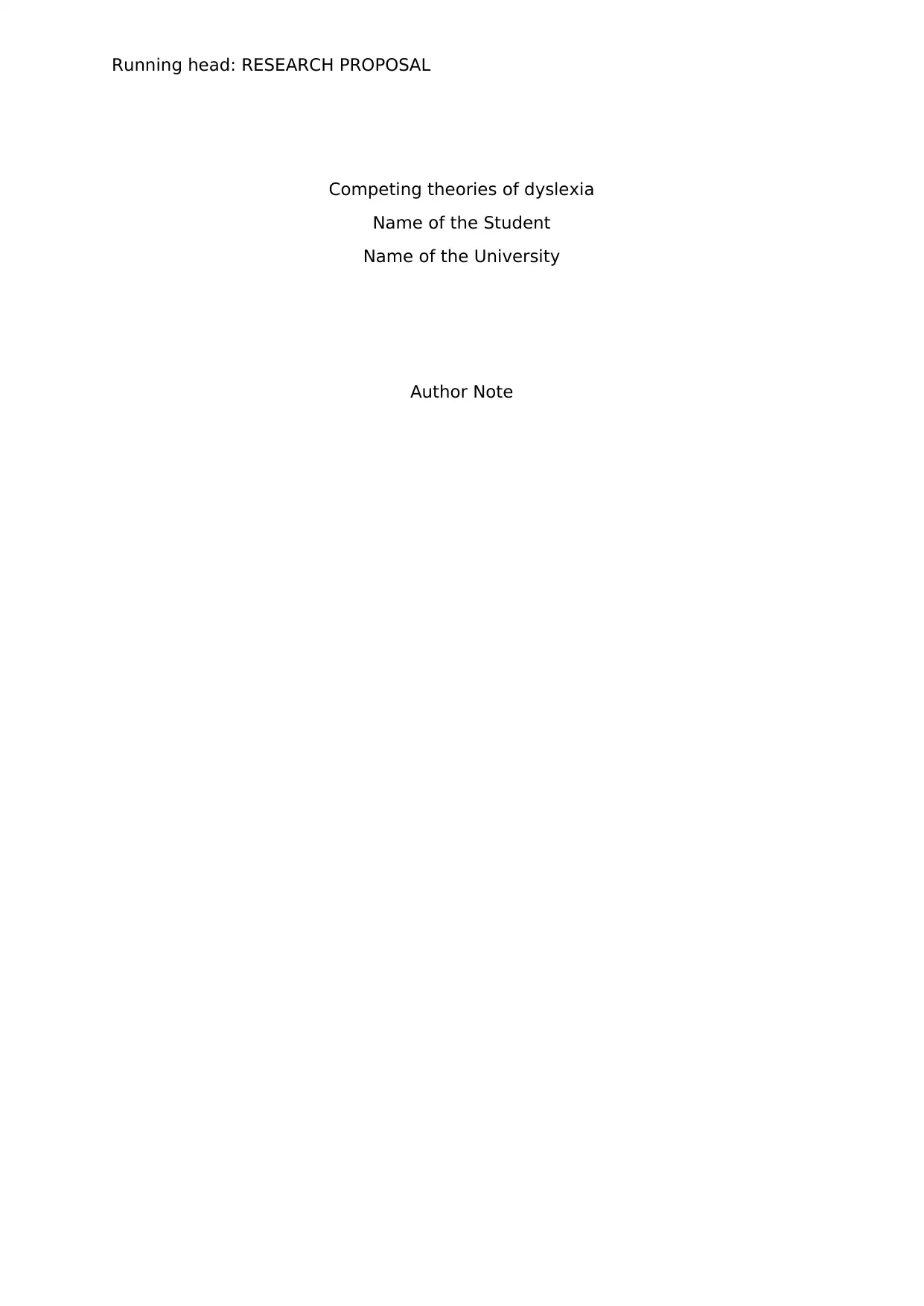
Running head: RESEARCH PROPOSAL
Competing theories of dyslexia
Name of the Student
Name of the University
Author Note
Competing theories of dyslexia
Name of the Student
Name of the University
Author Note
Paraphrase This Document
Need a fresh take? Get an instant paraphrase of this document with our AI Paraphraser
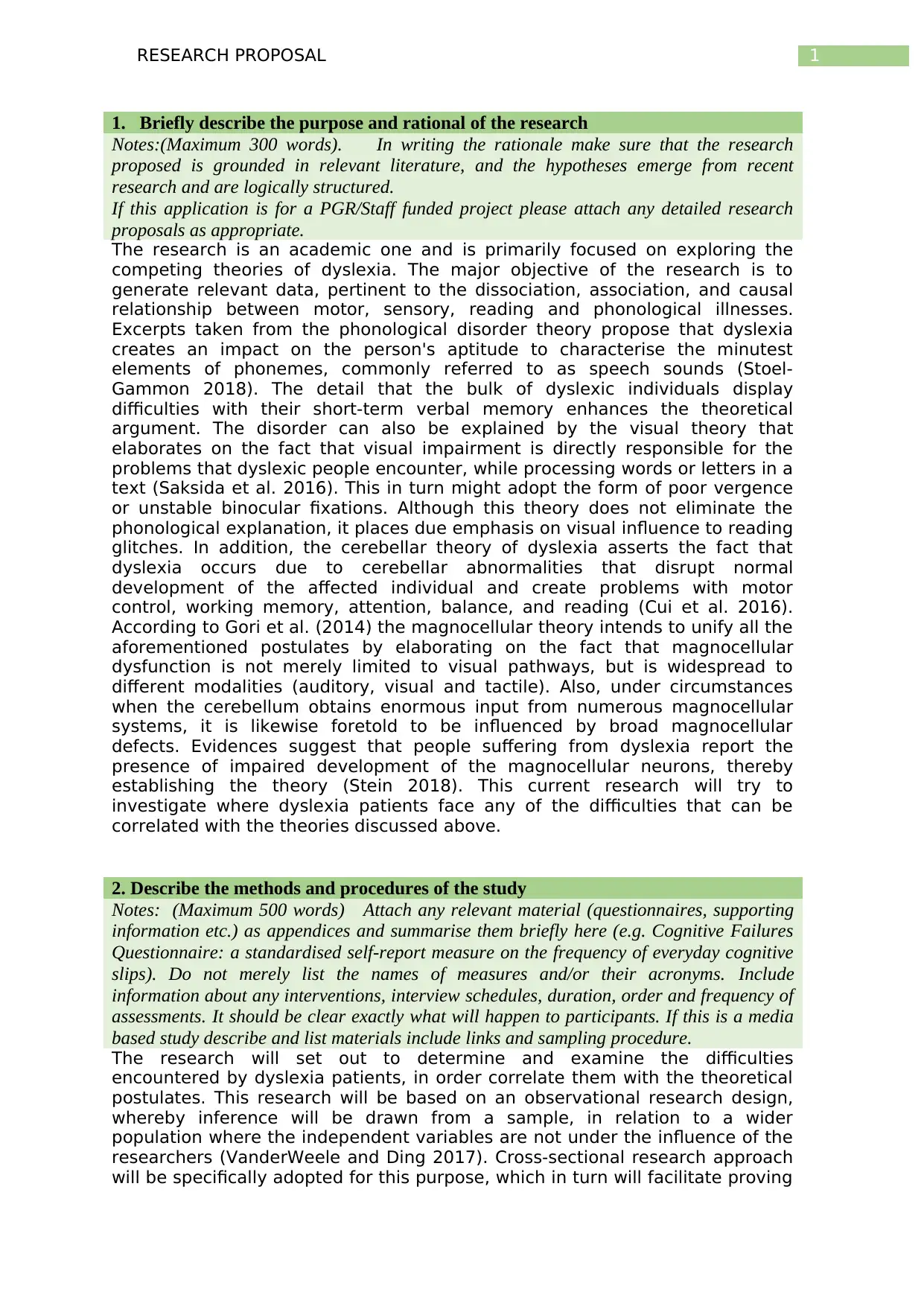
1RESEARCH PROPOSAL
1. Briefly describe the purpose and rational of the research
Notes:(Maximum 300 words). In writing the rationale make sure that the research
proposed is grounded in relevant literature, and the hypotheses emerge from recent
research and are logically structured.
If this application is for a PGR/Staff funded project please attach any detailed research
proposals as appropriate.
The research is an academic one and is primarily focused on exploring the
competing theories of dyslexia. The major objective of the research is to
generate relevant data, pertinent to the dissociation, association, and causal
relationship between motor, sensory, reading and phonological illnesses.
Excerpts taken from the phonological disorder theory propose that dyslexia
creates an impact on the person's aptitude to characterise the minutest
elements of phonemes, commonly referred to as speech sounds (Stoel-
Gammon 2018). The detail that the bulk of dyslexic individuals display
difficulties with their short-term verbal memory enhances the theoretical
argument. The disorder can also be explained by the visual theory that
elaborates on the fact that visual impairment is directly responsible for the
problems that dyslexic people encounter, while processing words or letters in a
text (Saksida et al. 2016). This in turn might adopt the form of poor vergence
or unstable binocular fixations. Although this theory does not eliminate the
phonological explanation, it places due emphasis on visual influence to reading
glitches. In addition, the cerebellar theory of dyslexia asserts the fact that
dyslexia occurs due to cerebellar abnormalities that disrupt normal
development of the affected individual and create problems with motor
control, working memory, attention, balance, and reading (Cui et al. 2016).
According to Gori et al. (2014) the magnocellular theory intends to unify all the
aforementioned postulates by elaborating on the fact that magnocellular
dysfunction is not merely limited to visual pathways, but is widespread to
different modalities (auditory, visual and tactile). Also, under circumstances
when the cerebellum obtains enormous input from numerous magnocellular
systems, it is likewise foretold to be influenced by broad magnocellular
defects. Evidences suggest that people suffering from dyslexia report the
presence of impaired development of the magnocellular neurons, thereby
establishing the theory (Stein 2018). This current research will try to
investigate where dyslexia patients face any of the difficulties that can be
correlated with the theories discussed above.
2. Describe the methods and procedures of the study
Notes: (Maximum 500 words) Attach any relevant material (questionnaires, supporting
information etc.) as appendices and summarise them briefly here (e.g. Cognitive Failures
Questionnaire: a standardised self-report measure on the frequency of everyday cognitive
slips). Do not merely list the names of measures and/or their acronyms. Include
information about any interventions, interview schedules, duration, order and frequency of
assessments. It should be clear exactly what will happen to participants. If this is a media
based study describe and list materials include links and sampling procedure.
The research will set out to determine and examine the difficulties
encountered by dyslexia patients, in order correlate them with the theoretical
postulates. This research will be based on an observational research design,
whereby inference will be drawn from a sample, in relation to a wider
population where the independent variables are not under the influence of the
researchers (VanderWeele and Ding 2017). Cross-sectional research approach
will be specifically adopted for this purpose, which in turn will facilitate proving
1. Briefly describe the purpose and rational of the research
Notes:(Maximum 300 words). In writing the rationale make sure that the research
proposed is grounded in relevant literature, and the hypotheses emerge from recent
research and are logically structured.
If this application is for a PGR/Staff funded project please attach any detailed research
proposals as appropriate.
The research is an academic one and is primarily focused on exploring the
competing theories of dyslexia. The major objective of the research is to
generate relevant data, pertinent to the dissociation, association, and causal
relationship between motor, sensory, reading and phonological illnesses.
Excerpts taken from the phonological disorder theory propose that dyslexia
creates an impact on the person's aptitude to characterise the minutest
elements of phonemes, commonly referred to as speech sounds (Stoel-
Gammon 2018). The detail that the bulk of dyslexic individuals display
difficulties with their short-term verbal memory enhances the theoretical
argument. The disorder can also be explained by the visual theory that
elaborates on the fact that visual impairment is directly responsible for the
problems that dyslexic people encounter, while processing words or letters in a
text (Saksida et al. 2016). This in turn might adopt the form of poor vergence
or unstable binocular fixations. Although this theory does not eliminate the
phonological explanation, it places due emphasis on visual influence to reading
glitches. In addition, the cerebellar theory of dyslexia asserts the fact that
dyslexia occurs due to cerebellar abnormalities that disrupt normal
development of the affected individual and create problems with motor
control, working memory, attention, balance, and reading (Cui et al. 2016).
According to Gori et al. (2014) the magnocellular theory intends to unify all the
aforementioned postulates by elaborating on the fact that magnocellular
dysfunction is not merely limited to visual pathways, but is widespread to
different modalities (auditory, visual and tactile). Also, under circumstances
when the cerebellum obtains enormous input from numerous magnocellular
systems, it is likewise foretold to be influenced by broad magnocellular
defects. Evidences suggest that people suffering from dyslexia report the
presence of impaired development of the magnocellular neurons, thereby
establishing the theory (Stein 2018). This current research will try to
investigate where dyslexia patients face any of the difficulties that can be
correlated with the theories discussed above.
2. Describe the methods and procedures of the study
Notes: (Maximum 500 words) Attach any relevant material (questionnaires, supporting
information etc.) as appendices and summarise them briefly here (e.g. Cognitive Failures
Questionnaire: a standardised self-report measure on the frequency of everyday cognitive
slips). Do not merely list the names of measures and/or their acronyms. Include
information about any interventions, interview schedules, duration, order and frequency of
assessments. It should be clear exactly what will happen to participants. If this is a media
based study describe and list materials include links and sampling procedure.
The research will set out to determine and examine the difficulties
encountered by dyslexia patients, in order correlate them with the theoretical
postulates. This research will be based on an observational research design,
whereby inference will be drawn from a sample, in relation to a wider
population where the independent variables are not under the influence of the
researchers (VanderWeele and Ding 2017). Cross-sectional research approach
will be specifically adopted for this purpose, which in turn will facilitate proving
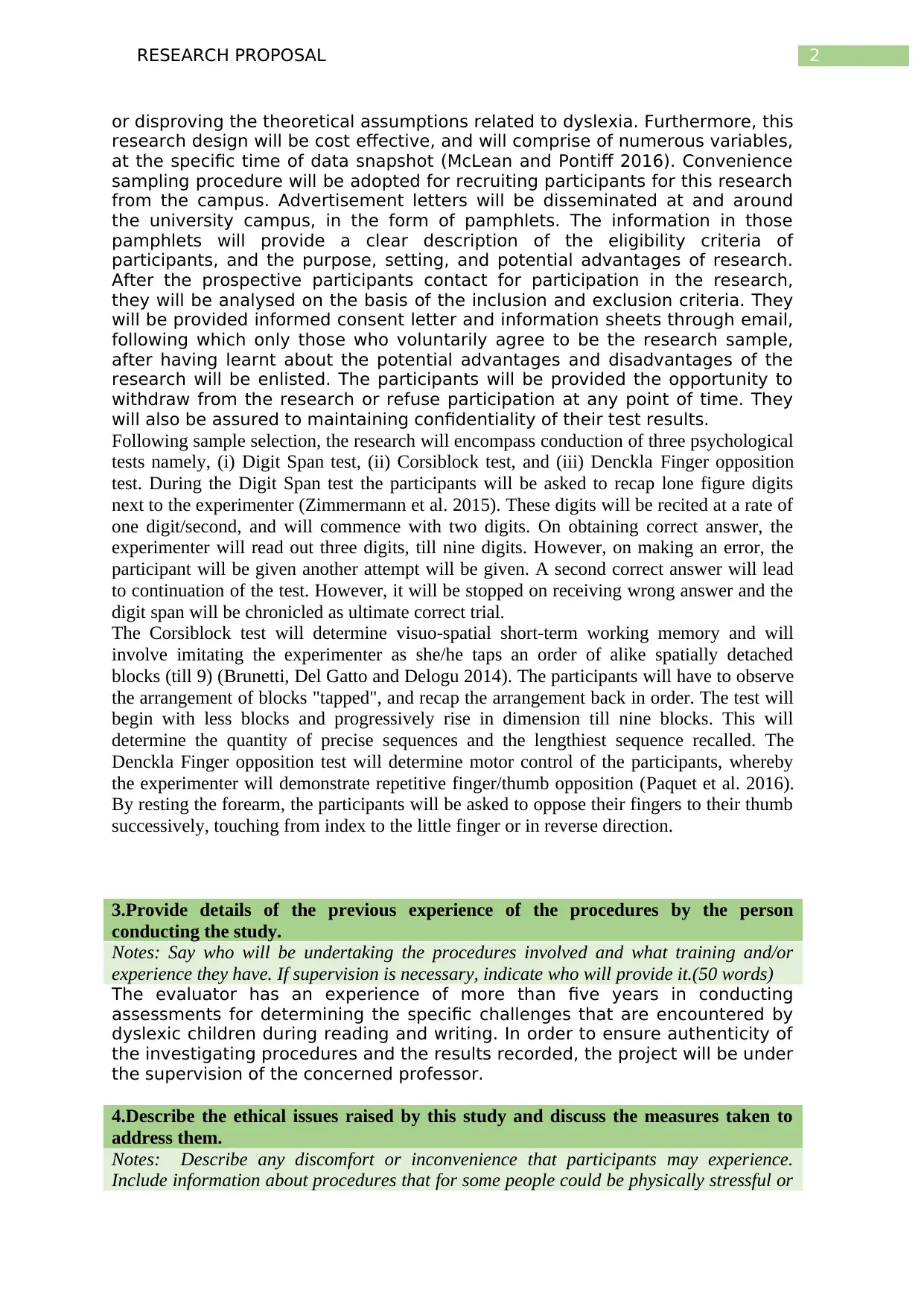
2RESEARCH PROPOSAL
or disproving the theoretical assumptions related to dyslexia. Furthermore, this
research design will be cost effective, and will comprise of numerous variables,
at the specific time of data snapshot (McLean and Pontiff 2016). Convenience
sampling procedure will be adopted for recruiting participants for this research
from the campus. Advertisement letters will be disseminated at and around
the university campus, in the form of pamphlets. The information in those
pamphlets will provide a clear description of the eligibility criteria of
participants, and the purpose, setting, and potential advantages of research.
After the prospective participants contact for participation in the research,
they will be analysed on the basis of the inclusion and exclusion criteria. They
will be provided informed consent letter and information sheets through email,
following which only those who voluntarily agree to be the research sample,
after having learnt about the potential advantages and disadvantages of the
research will be enlisted. The participants will be provided the opportunity to
withdraw from the research or refuse participation at any point of time. They
will also be assured to maintaining confidentiality of their test results.
Following sample selection, the research will encompass conduction of three psychological
tests namely, (i) Digit Span test, (ii) Corsiblock test, and (iii) Denckla Finger opposition
test. During the Digit Span test the participants will be asked to recap lone figure digits
next to the experimenter (Zimmermann et al. 2015). These digits will be recited at a rate of
one digit/second, and will commence with two digits. On obtaining correct answer, the
experimenter will read out three digits, till nine digits. However, on making an error, the
participant will be given another attempt will be given. A second correct answer will lead
to continuation of the test. However, it will be stopped on receiving wrong answer and the
digit span will be chronicled as ultimate correct trial.
The Corsiblock test will determine visuo-spatial short-term working memory and will
involve imitating the experimenter as she/he taps an order of alike spatially detached
blocks (till 9) (Brunetti, Del Gatto and Delogu 2014). The participants will have to observe
the arrangement of blocks "tapped", and recap the arrangement back in order. The test will
begin with less blocks and progressively rise in dimension till nine blocks. This will
determine the quantity of precise sequences and the lengthiest sequence recalled. The
Denckla Finger opposition test will determine motor control of the participants, whereby
the experimenter will demonstrate repetitive finger/thumb opposition (Paquet et al. 2016).
By resting the forearm, the participants will be asked to oppose their fingers to their thumb
successively, touching from index to the little finger or in reverse direction.
3.Provide details of the previous experience of the procedures by the person
conducting the study.
Notes: Say who will be undertaking the procedures involved and what training and/or
experience they have. If supervision is necessary, indicate who will provide it.(50 words)
The evaluator has an experience of more than five years in conducting
assessments for determining the specific challenges that are encountered by
dyslexic children during reading and writing. In order to ensure authenticity of
the investigating procedures and the results recorded, the project will be under
the supervision of the concerned professor.
4.Describe the ethical issues raised by this study and discuss the measures taken to
address them.
Notes: Describe any discomfort or inconvenience that participants may experience.
Include information about procedures that for some people could be physically stressful or
or disproving the theoretical assumptions related to dyslexia. Furthermore, this
research design will be cost effective, and will comprise of numerous variables,
at the specific time of data snapshot (McLean and Pontiff 2016). Convenience
sampling procedure will be adopted for recruiting participants for this research
from the campus. Advertisement letters will be disseminated at and around
the university campus, in the form of pamphlets. The information in those
pamphlets will provide a clear description of the eligibility criteria of
participants, and the purpose, setting, and potential advantages of research.
After the prospective participants contact for participation in the research,
they will be analysed on the basis of the inclusion and exclusion criteria. They
will be provided informed consent letter and information sheets through email,
following which only those who voluntarily agree to be the research sample,
after having learnt about the potential advantages and disadvantages of the
research will be enlisted. The participants will be provided the opportunity to
withdraw from the research or refuse participation at any point of time. They
will also be assured to maintaining confidentiality of their test results.
Following sample selection, the research will encompass conduction of three psychological
tests namely, (i) Digit Span test, (ii) Corsiblock test, and (iii) Denckla Finger opposition
test. During the Digit Span test the participants will be asked to recap lone figure digits
next to the experimenter (Zimmermann et al. 2015). These digits will be recited at a rate of
one digit/second, and will commence with two digits. On obtaining correct answer, the
experimenter will read out three digits, till nine digits. However, on making an error, the
participant will be given another attempt will be given. A second correct answer will lead
to continuation of the test. However, it will be stopped on receiving wrong answer and the
digit span will be chronicled as ultimate correct trial.
The Corsiblock test will determine visuo-spatial short-term working memory and will
involve imitating the experimenter as she/he taps an order of alike spatially detached
blocks (till 9) (Brunetti, Del Gatto and Delogu 2014). The participants will have to observe
the arrangement of blocks "tapped", and recap the arrangement back in order. The test will
begin with less blocks and progressively rise in dimension till nine blocks. This will
determine the quantity of precise sequences and the lengthiest sequence recalled. The
Denckla Finger opposition test will determine motor control of the participants, whereby
the experimenter will demonstrate repetitive finger/thumb opposition (Paquet et al. 2016).
By resting the forearm, the participants will be asked to oppose their fingers to their thumb
successively, touching from index to the little finger or in reverse direction.
3.Provide details of the previous experience of the procedures by the person
conducting the study.
Notes: Say who will be undertaking the procedures involved and what training and/or
experience they have. If supervision is necessary, indicate who will provide it.(50 words)
The evaluator has an experience of more than five years in conducting
assessments for determining the specific challenges that are encountered by
dyslexic children during reading and writing. In order to ensure authenticity of
the investigating procedures and the results recorded, the project will be under
the supervision of the concerned professor.
4.Describe the ethical issues raised by this study and discuss the measures taken to
address them.
Notes: Describe any discomfort or inconvenience that participants may experience.
Include information about procedures that for some people could be physically stressful or
⊘ This is a preview!⊘
Do you want full access?
Subscribe today to unlock all pages.

Trusted by 1+ million students worldwide
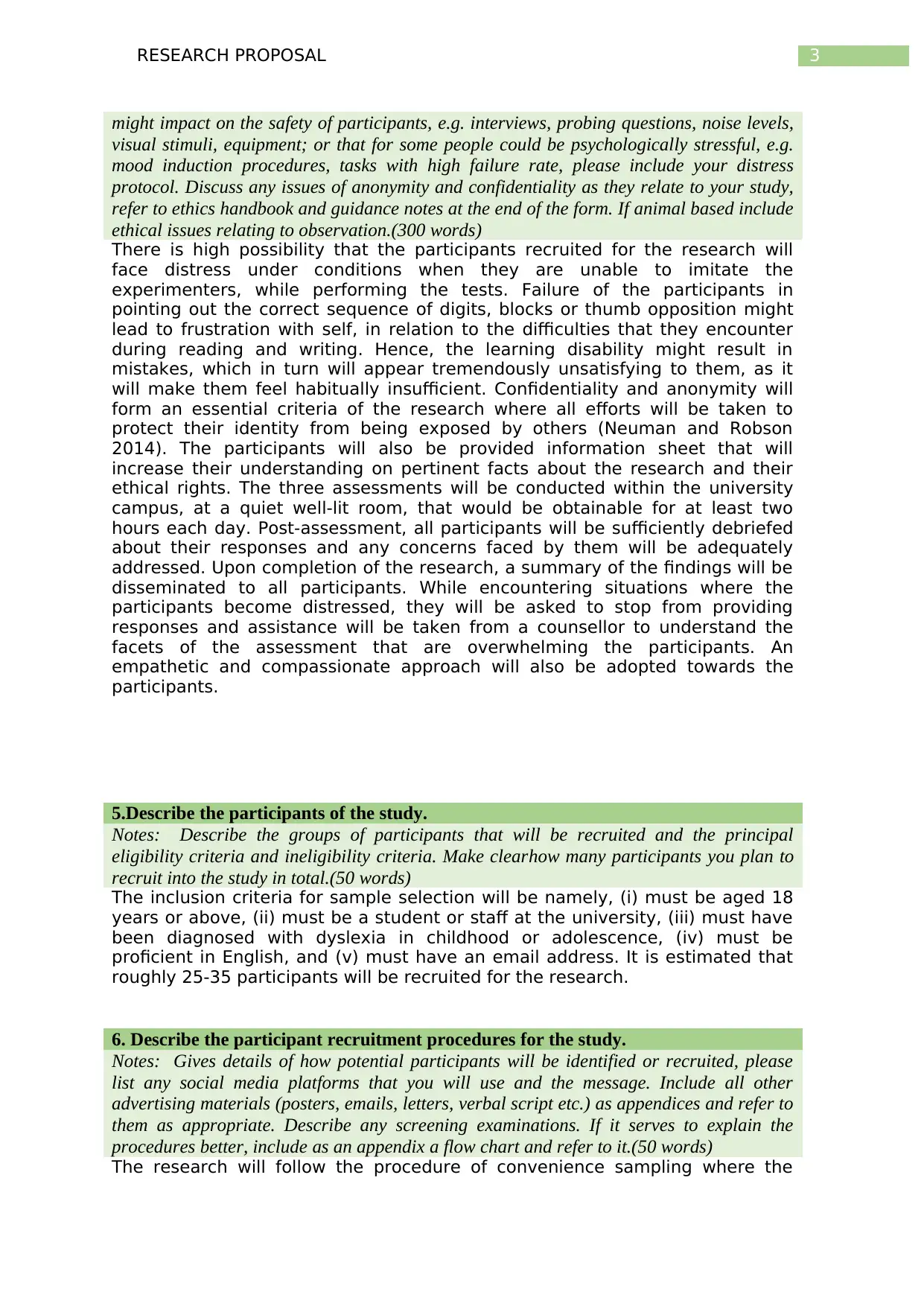
3RESEARCH PROPOSAL
might impact on the safety of participants, e.g. interviews, probing questions, noise levels,
visual stimuli, equipment; or that for some people could be psychologically stressful, e.g.
mood induction procedures, tasks with high failure rate, please include your distress
protocol. Discuss any issues of anonymity and confidentiality as they relate to your study,
refer to ethics handbook and guidance notes at the end of the form. If animal based include
ethical issues relating to observation.(300 words)
There is high possibility that the participants recruited for the research will
face distress under conditions when they are unable to imitate the
experimenters, while performing the tests. Failure of the participants in
pointing out the correct sequence of digits, blocks or thumb opposition might
lead to frustration with self, in relation to the difficulties that they encounter
during reading and writing. Hence, the learning disability might result in
mistakes, which in turn will appear tremendously unsatisfying to them, as it
will make them feel habitually insufficient. Confidentiality and anonymity will
form an essential criteria of the research where all efforts will be taken to
protect their identity from being exposed by others (Neuman and Robson
2014). The participants will also be provided information sheet that will
increase their understanding on pertinent facts about the research and their
ethical rights. The three assessments will be conducted within the university
campus, at a quiet well-lit room, that would be obtainable for at least two
hours each day. Post-assessment, all participants will be sufficiently debriefed
about their responses and any concerns faced by them will be adequately
addressed. Upon completion of the research, a summary of the findings will be
disseminated to all participants. While encountering situations where the
participants become distressed, they will be asked to stop from providing
responses and assistance will be taken from a counsellor to understand the
facets of the assessment that are overwhelming the participants. An
empathetic and compassionate approach will also be adopted towards the
participants.
5.Describe the participants of the study.
Notes: Describe the groups of participants that will be recruited and the principal
eligibility criteria and ineligibility criteria. Make clearhow many participants you plan to
recruit into the study in total.(50 words)
The inclusion criteria for sample selection will be namely, (i) must be aged 18
years or above, (ii) must be a student or staff at the university, (iii) must have
been diagnosed with dyslexia in childhood or adolescence, (iv) must be
proficient in English, and (v) must have an email address. It is estimated that
roughly 25-35 participants will be recruited for the research.
6. Describe the participant recruitment procedures for the study.
Notes: Gives details of how potential participants will be identified or recruited, please
list any social media platforms that you will use and the message. Include all other
advertising materials (posters, emails, letters, verbal script etc.) as appendices and refer to
them as appropriate. Describe any screening examinations. If it serves to explain the
procedures better, include as an appendix a flow chart and refer to it.(50 words)
The research will follow the procedure of convenience sampling where the
might impact on the safety of participants, e.g. interviews, probing questions, noise levels,
visual stimuli, equipment; or that for some people could be psychologically stressful, e.g.
mood induction procedures, tasks with high failure rate, please include your distress
protocol. Discuss any issues of anonymity and confidentiality as they relate to your study,
refer to ethics handbook and guidance notes at the end of the form. If animal based include
ethical issues relating to observation.(300 words)
There is high possibility that the participants recruited for the research will
face distress under conditions when they are unable to imitate the
experimenters, while performing the tests. Failure of the participants in
pointing out the correct sequence of digits, blocks or thumb opposition might
lead to frustration with self, in relation to the difficulties that they encounter
during reading and writing. Hence, the learning disability might result in
mistakes, which in turn will appear tremendously unsatisfying to them, as it
will make them feel habitually insufficient. Confidentiality and anonymity will
form an essential criteria of the research where all efforts will be taken to
protect their identity from being exposed by others (Neuman and Robson
2014). The participants will also be provided information sheet that will
increase their understanding on pertinent facts about the research and their
ethical rights. The three assessments will be conducted within the university
campus, at a quiet well-lit room, that would be obtainable for at least two
hours each day. Post-assessment, all participants will be sufficiently debriefed
about their responses and any concerns faced by them will be adequately
addressed. Upon completion of the research, a summary of the findings will be
disseminated to all participants. While encountering situations where the
participants become distressed, they will be asked to stop from providing
responses and assistance will be taken from a counsellor to understand the
facets of the assessment that are overwhelming the participants. An
empathetic and compassionate approach will also be adopted towards the
participants.
5.Describe the participants of the study.
Notes: Describe the groups of participants that will be recruited and the principal
eligibility criteria and ineligibility criteria. Make clearhow many participants you plan to
recruit into the study in total.(50 words)
The inclusion criteria for sample selection will be namely, (i) must be aged 18
years or above, (ii) must be a student or staff at the university, (iii) must have
been diagnosed with dyslexia in childhood or adolescence, (iv) must be
proficient in English, and (v) must have an email address. It is estimated that
roughly 25-35 participants will be recruited for the research.
6. Describe the participant recruitment procedures for the study.
Notes: Gives details of how potential participants will be identified or recruited, please
list any social media platforms that you will use and the message. Include all other
advertising materials (posters, emails, letters, verbal script etc.) as appendices and refer to
them as appropriate. Describe any screening examinations. If it serves to explain the
procedures better, include as an appendix a flow chart and refer to it.(50 words)
The research will follow the procedure of convenience sampling where the
Paraphrase This Document
Need a fresh take? Get an instant paraphrase of this document with our AI Paraphraser
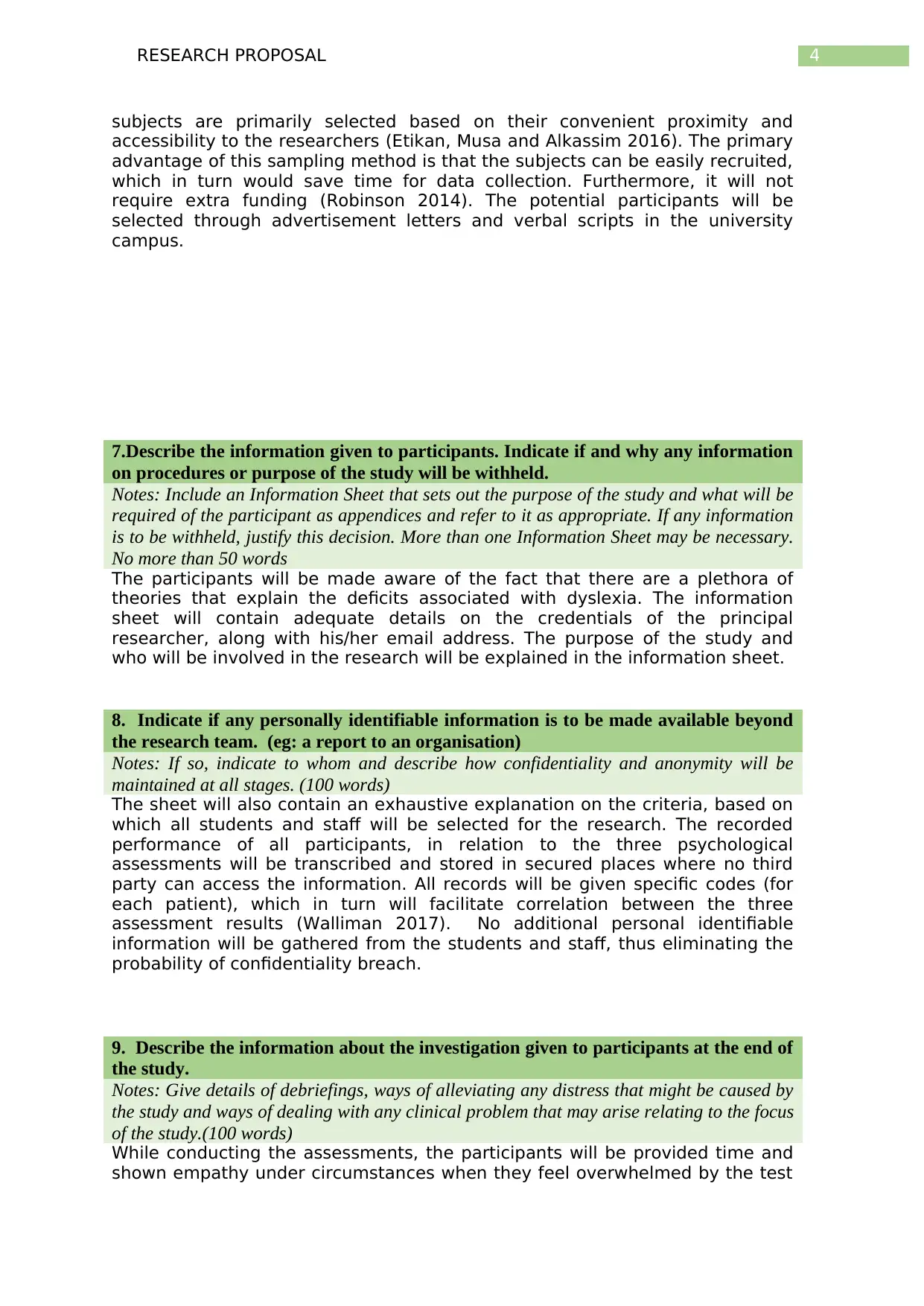
4RESEARCH PROPOSAL
subjects are primarily selected based on their convenient proximity and
accessibility to the researchers (Etikan, Musa and Alkassim 2016). The primary
advantage of this sampling method is that the subjects can be easily recruited,
which in turn would save time for data collection. Furthermore, it will not
require extra funding (Robinson 2014). The potential participants will be
selected through advertisement letters and verbal scripts in the university
campus.
7.Describe the information given to participants. Indicate if and why any information
on procedures or purpose of the study will be withheld.
Notes: Include an Information Sheet that sets out the purpose of the study and what will be
required of the participant as appendices and refer to it as appropriate. If any information
is to be withheld, justify this decision. More than one Information Sheet may be necessary.
No more than 50 words
The participants will be made aware of the fact that there are a plethora of
theories that explain the deficits associated with dyslexia. The information
sheet will contain adequate details on the credentials of the principal
researcher, along with his/her email address. The purpose of the study and
who will be involved in the research will be explained in the information sheet.
8. Indicate if any personally identifiable information is to be made available beyond
the research team. (eg: a report to an organisation)
Notes: If so, indicate to whom and describe how confidentiality and anonymity will be
maintained at all stages. (100 words)
The sheet will also contain an exhaustive explanation on the criteria, based on
which all students and staff will be selected for the research. The recorded
performance of all participants, in relation to the three psychological
assessments will be transcribed and stored in secured places where no third
party can access the information. All records will be given specific codes (for
each patient), which in turn will facilitate correlation between the three
assessment results (Walliman 2017). No additional personal identifiable
information will be gathered from the students and staff, thus eliminating the
probability of confidentiality breach.
9. Describe the information about the investigation given to participants at the end of
the study.
Notes: Give details of debriefings, ways of alleviating any distress that might be caused by
the study and ways of dealing with any clinical problem that may arise relating to the focus
of the study.(100 words)
While conducting the assessments, the participants will be provided time and
shown empathy under circumstances when they feel overwhelmed by the test
subjects are primarily selected based on their convenient proximity and
accessibility to the researchers (Etikan, Musa and Alkassim 2016). The primary
advantage of this sampling method is that the subjects can be easily recruited,
which in turn would save time for data collection. Furthermore, it will not
require extra funding (Robinson 2014). The potential participants will be
selected through advertisement letters and verbal scripts in the university
campus.
7.Describe the information given to participants. Indicate if and why any information
on procedures or purpose of the study will be withheld.
Notes: Include an Information Sheet that sets out the purpose of the study and what will be
required of the participant as appendices and refer to it as appropriate. If any information
is to be withheld, justify this decision. More than one Information Sheet may be necessary.
No more than 50 words
The participants will be made aware of the fact that there are a plethora of
theories that explain the deficits associated with dyslexia. The information
sheet will contain adequate details on the credentials of the principal
researcher, along with his/her email address. The purpose of the study and
who will be involved in the research will be explained in the information sheet.
8. Indicate if any personally identifiable information is to be made available beyond
the research team. (eg: a report to an organisation)
Notes: If so, indicate to whom and describe how confidentiality and anonymity will be
maintained at all stages. (100 words)
The sheet will also contain an exhaustive explanation on the criteria, based on
which all students and staff will be selected for the research. The recorded
performance of all participants, in relation to the three psychological
assessments will be transcribed and stored in secured places where no third
party can access the information. All records will be given specific codes (for
each patient), which in turn will facilitate correlation between the three
assessment results (Walliman 2017). No additional personal identifiable
information will be gathered from the students and staff, thus eliminating the
probability of confidentiality breach.
9. Describe the information about the investigation given to participants at the end of
the study.
Notes: Give details of debriefings, ways of alleviating any distress that might be caused by
the study and ways of dealing with any clinical problem that may arise relating to the focus
of the study.(100 words)
While conducting the assessments, the participants will be provided time and
shown empathy under circumstances when they feel overwhelmed by the test
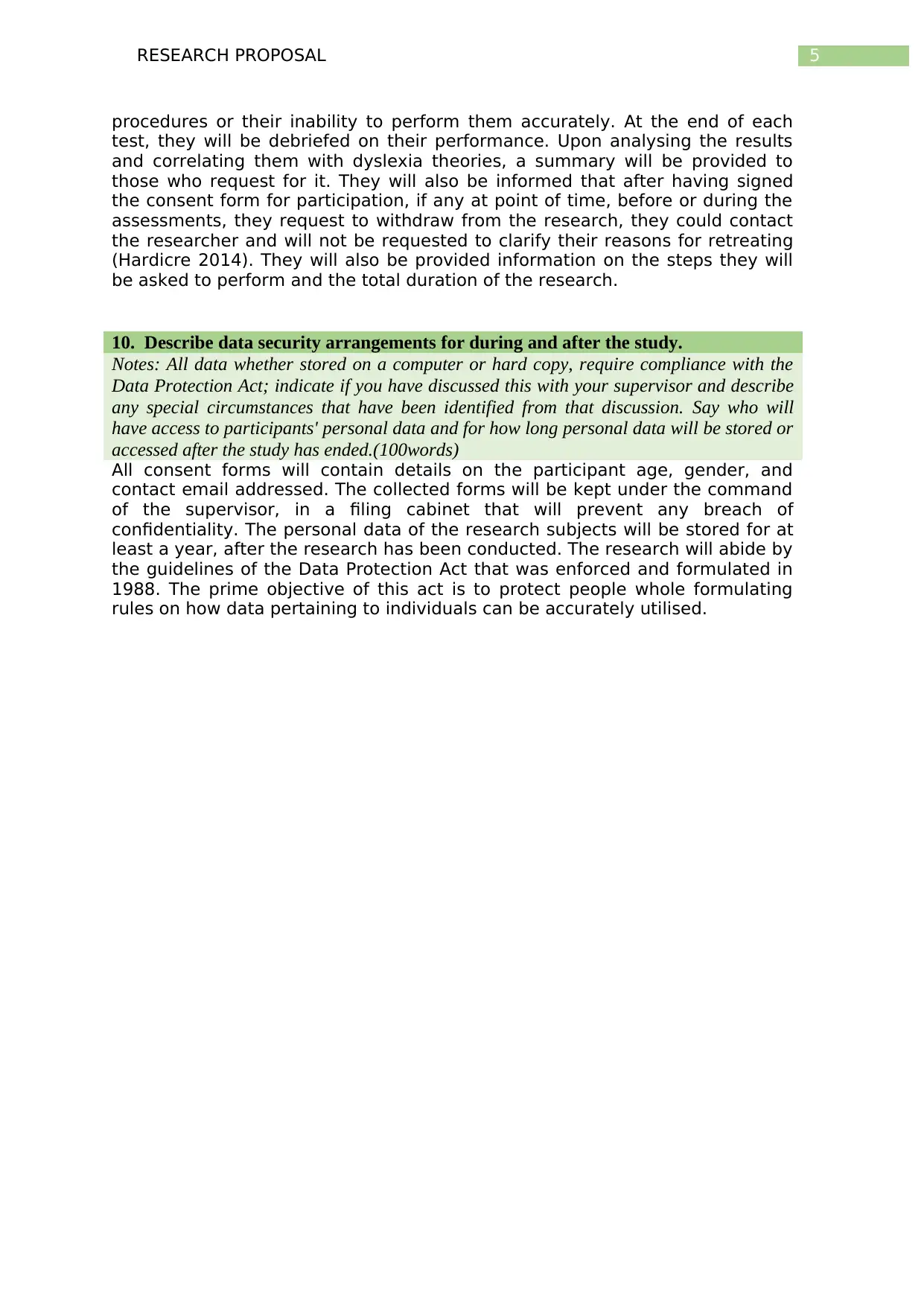
5RESEARCH PROPOSAL
procedures or their inability to perform them accurately. At the end of each
test, they will be debriefed on their performance. Upon analysing the results
and correlating them with dyslexia theories, a summary will be provided to
those who request for it. They will also be informed that after having signed
the consent form for participation, if any at point of time, before or during the
assessments, they request to withdraw from the research, they could contact
the researcher and will not be requested to clarify their reasons for retreating
(Hardicre 2014). They will also be provided information on the steps they will
be asked to perform and the total duration of the research.
10. Describe data security arrangements for during and after the study.
Notes: All data whether stored on a computer or hard copy, require compliance with the
Data Protection Act; indicate if you have discussed this with your supervisor and describe
any special circumstances that have been identified from that discussion. Say who will
have access to participants' personal data and for how long personal data will be stored or
accessed after the study has ended.(100words)
All consent forms will contain details on the participant age, gender, and
contact email addressed. The collected forms will be kept under the command
of the supervisor, in a filing cabinet that will prevent any breach of
confidentiality. The personal data of the research subjects will be stored for at
least a year, after the research has been conducted. The research will abide by
the guidelines of the Data Protection Act that was enforced and formulated in
1988. The prime objective of this act is to protect people whole formulating
rules on how data pertaining to individuals can be accurately utilised.
procedures or their inability to perform them accurately. At the end of each
test, they will be debriefed on their performance. Upon analysing the results
and correlating them with dyslexia theories, a summary will be provided to
those who request for it. They will also be informed that after having signed
the consent form for participation, if any at point of time, before or during the
assessments, they request to withdraw from the research, they could contact
the researcher and will not be requested to clarify their reasons for retreating
(Hardicre 2014). They will also be provided information on the steps they will
be asked to perform and the total duration of the research.
10. Describe data security arrangements for during and after the study.
Notes: All data whether stored on a computer or hard copy, require compliance with the
Data Protection Act; indicate if you have discussed this with your supervisor and describe
any special circumstances that have been identified from that discussion. Say who will
have access to participants' personal data and for how long personal data will be stored or
accessed after the study has ended.(100words)
All consent forms will contain details on the participant age, gender, and
contact email addressed. The collected forms will be kept under the command
of the supervisor, in a filing cabinet that will prevent any breach of
confidentiality. The personal data of the research subjects will be stored for at
least a year, after the research has been conducted. The research will abide by
the guidelines of the Data Protection Act that was enforced and formulated in
1988. The prime objective of this act is to protect people whole formulating
rules on how data pertaining to individuals can be accurately utilised.
⊘ This is a preview!⊘
Do you want full access?
Subscribe today to unlock all pages.

Trusted by 1+ million students worldwide
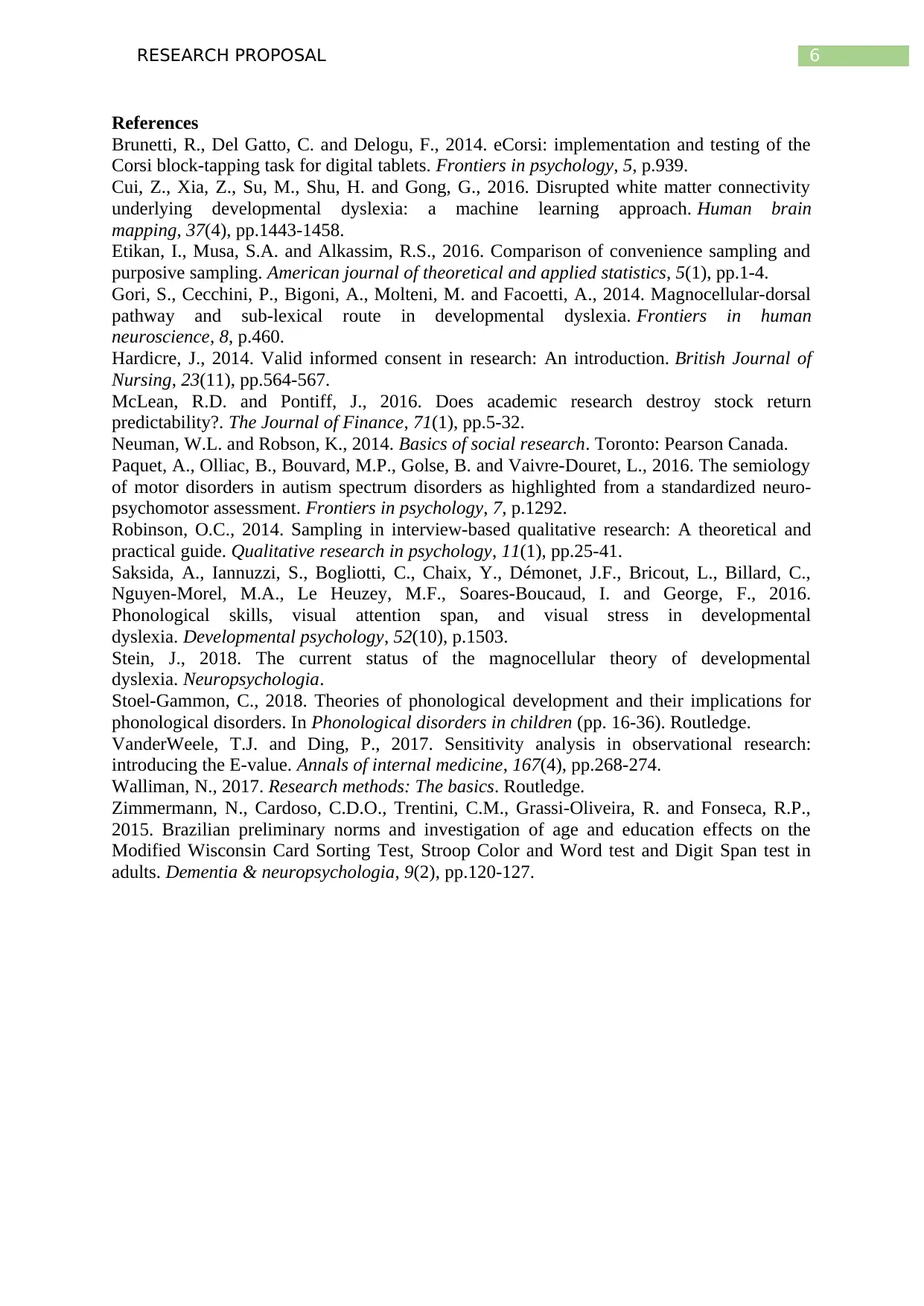
6RESEARCH PROPOSAL
References
Brunetti, R., Del Gatto, C. and Delogu, F., 2014. eCorsi: implementation and testing of the
Corsi block-tapping task for digital tablets. Frontiers in psychology, 5, p.939.
Cui, Z., Xia, Z., Su, M., Shu, H. and Gong, G., 2016. Disrupted white matter connectivity
underlying developmental dyslexia: a machine learning approach. Human brain
mapping, 37(4), pp.1443-1458.
Etikan, I., Musa, S.A. and Alkassim, R.S., 2016. Comparison of convenience sampling and
purposive sampling. American journal of theoretical and applied statistics, 5(1), pp.1-4.
Gori, S., Cecchini, P., Bigoni, A., Molteni, M. and Facoetti, A., 2014. Magnocellular-dorsal
pathway and sub-lexical route in developmental dyslexia. Frontiers in human
neuroscience, 8, p.460.
Hardicre, J., 2014. Valid informed consent in research: An introduction. British Journal of
Nursing, 23(11), pp.564-567.
McLean, R.D. and Pontiff, J., 2016. Does academic research destroy stock return
predictability?. The Journal of Finance, 71(1), pp.5-32.
Neuman, W.L. and Robson, K., 2014. Basics of social research. Toronto: Pearson Canada.
Paquet, A., Olliac, B., Bouvard, M.P., Golse, B. and Vaivre-Douret, L., 2016. The semiology
of motor disorders in autism spectrum disorders as highlighted from a standardized neuro-
psychomotor assessment. Frontiers in psychology, 7, p.1292.
Robinson, O.C., 2014. Sampling in interview-based qualitative research: A theoretical and
practical guide. Qualitative research in psychology, 11(1), pp.25-41.
Saksida, A., Iannuzzi, S., Bogliotti, C., Chaix, Y., Démonet, J.F., Bricout, L., Billard, C.,
Nguyen-Morel, M.A., Le Heuzey, M.F., Soares-Boucaud, I. and George, F., 2016.
Phonological skills, visual attention span, and visual stress in developmental
dyslexia. Developmental psychology, 52(10), p.1503.
Stein, J., 2018. The current status of the magnocellular theory of developmental
dyslexia. Neuropsychologia.
Stoel-Gammon, C., 2018. Theories of phonological development and their implications for
phonological disorders. In Phonological disorders in children (pp. 16-36). Routledge.
VanderWeele, T.J. and Ding, P., 2017. Sensitivity analysis in observational research:
introducing the E-value. Annals of internal medicine, 167(4), pp.268-274.
Walliman, N., 2017. Research methods: The basics. Routledge.
Zimmermann, N., Cardoso, C.D.O., Trentini, C.M., Grassi-Oliveira, R. and Fonseca, R.P.,
2015. Brazilian preliminary norms and investigation of age and education effects on the
Modified Wisconsin Card Sorting Test, Stroop Color and Word test and Digit Span test in
adults. Dementia & neuropsychologia, 9(2), pp.120-127.
References
Brunetti, R., Del Gatto, C. and Delogu, F., 2014. eCorsi: implementation and testing of the
Corsi block-tapping task for digital tablets. Frontiers in psychology, 5, p.939.
Cui, Z., Xia, Z., Su, M., Shu, H. and Gong, G., 2016. Disrupted white matter connectivity
underlying developmental dyslexia: a machine learning approach. Human brain
mapping, 37(4), pp.1443-1458.
Etikan, I., Musa, S.A. and Alkassim, R.S., 2016. Comparison of convenience sampling and
purposive sampling. American journal of theoretical and applied statistics, 5(1), pp.1-4.
Gori, S., Cecchini, P., Bigoni, A., Molteni, M. and Facoetti, A., 2014. Magnocellular-dorsal
pathway and sub-lexical route in developmental dyslexia. Frontiers in human
neuroscience, 8, p.460.
Hardicre, J., 2014. Valid informed consent in research: An introduction. British Journal of
Nursing, 23(11), pp.564-567.
McLean, R.D. and Pontiff, J., 2016. Does academic research destroy stock return
predictability?. The Journal of Finance, 71(1), pp.5-32.
Neuman, W.L. and Robson, K., 2014. Basics of social research. Toronto: Pearson Canada.
Paquet, A., Olliac, B., Bouvard, M.P., Golse, B. and Vaivre-Douret, L., 2016. The semiology
of motor disorders in autism spectrum disorders as highlighted from a standardized neuro-
psychomotor assessment. Frontiers in psychology, 7, p.1292.
Robinson, O.C., 2014. Sampling in interview-based qualitative research: A theoretical and
practical guide. Qualitative research in psychology, 11(1), pp.25-41.
Saksida, A., Iannuzzi, S., Bogliotti, C., Chaix, Y., Démonet, J.F., Bricout, L., Billard, C.,
Nguyen-Morel, M.A., Le Heuzey, M.F., Soares-Boucaud, I. and George, F., 2016.
Phonological skills, visual attention span, and visual stress in developmental
dyslexia. Developmental psychology, 52(10), p.1503.
Stein, J., 2018. The current status of the magnocellular theory of developmental
dyslexia. Neuropsychologia.
Stoel-Gammon, C., 2018. Theories of phonological development and their implications for
phonological disorders. In Phonological disorders in children (pp. 16-36). Routledge.
VanderWeele, T.J. and Ding, P., 2017. Sensitivity analysis in observational research:
introducing the E-value. Annals of internal medicine, 167(4), pp.268-274.
Walliman, N., 2017. Research methods: The basics. Routledge.
Zimmermann, N., Cardoso, C.D.O., Trentini, C.M., Grassi-Oliveira, R. and Fonseca, R.P.,
2015. Brazilian preliminary norms and investigation of age and education effects on the
Modified Wisconsin Card Sorting Test, Stroop Color and Word test and Digit Span test in
adults. Dementia & neuropsychologia, 9(2), pp.120-127.
1 out of 7
Your All-in-One AI-Powered Toolkit for Academic Success.
+13062052269
info@desklib.com
Available 24*7 on WhatsApp / Email
![[object Object]](/_next/static/media/star-bottom.7253800d.svg)
Unlock your academic potential
Copyright © 2020–2026 A2Z Services. All Rights Reserved. Developed and managed by ZUCOL.


